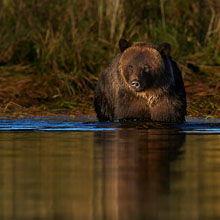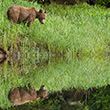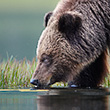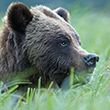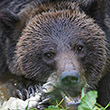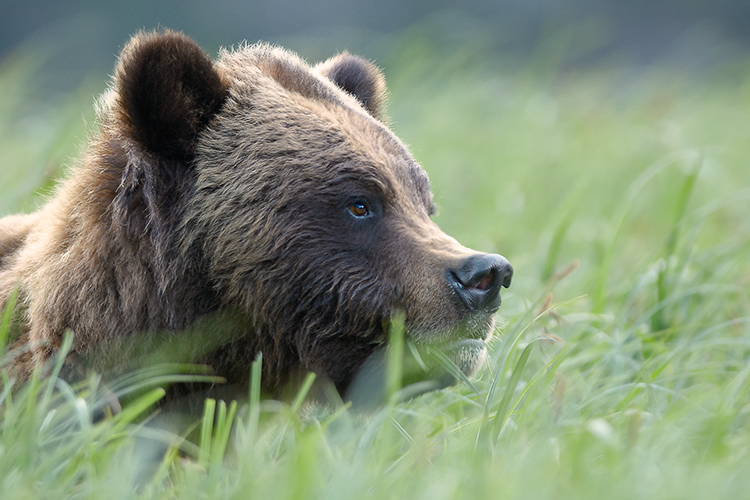
Availability: Limited Edition Print; RM Stock (??)
In the Field
Catching the Scent. Khutzeymateen Inlet, BC, Canada. June 6, 2006.
One of the most amazing things about the Khutzeymateen Inlet of northern BC is the grass - it grows so high by early June that it can almost obscure a large adult grizzly! We were very close to this adult male before we saw him in the tall grass. Despite our close proximity, the bear seemed much more concerned about what his nose was telling him! In this shot, I caught him crinkling his nose and sniffing the air (he probably smelled another bear nearby).
This was another situation almost tailor-made for a high-speed image-stabilized telephoto lens. Because we were floating in a packed inflatable zodiac boat tripod use was impossible. And, given the long grass, we had to stand to even see the bear! This was a real test for my 300 F2.8 VR lens. It passed (with flying colours).
Behind the Camera
Catching the Scent. Khutzeymateen Inlet, BC, Canada. June 6, 2006.
Digital Capture; Compressed RAW (NEF) format; ISO 200.
Nikon D200 with Nikon 300 mm f/2.8G ED-IF AF-S VR lens (450 mm equivalent with digital conversion factor) - hand held (VR turned to "On" and in "Normal" mode).
1/125s @ f2.8; no compensation from matrix-metered exposure setting.
At the Computer
Catching the Scent. Khutzeymateen Inlet, BC, Canada. June 6, 2006.
RAW Conversion to 16-bit TIFF, including first-pass sharpening and tone curve adjustment, using Phase One's C1 Pro.
All further digital correction using Adobe's Photoshop CS2, including selective additional tone curve adjustment, selective saturation (and desaturation) enhancement, and selective sharpening for web output.
Conservation
Catching the Scent. Khutzeymateen Inlet, BC, Canada. June 6, 2006.
Ten percent of the revenue generated by this image will be donated to Raincoast.
Species Status in Canada*: Special Concern (May 2002).
While Grizzly Bears (Ursus arctos) are not technically listed as "Endangered" in Canada, they have been extirpated from most of their historical range. Grizzly Bears are far more sensitive to intrusion/disturbance in their habitat than are Black Bears and are being increasingly forced into marginal habitat by human encroachment. The Great Bear Rainforest along the central and northern coast of British Columbia is one of the last strongholds of the Grizzly Bear in Canada, and even this population is coming under increasing pressure.
On December 18, 2017 the government of British Columbia banned grizzly hunting across the entire province. This major conservation victory came after decades of tireless work by many dedicated conservationists and ecologists and, most importantly, it reflects the opinion of the vast majority of British Columbians. And, it means that AT LEAST while the current government remains in power grizzlies are finally "safe" in British Columbia.
Now that we've at least temporarily won the battle to save grizzlies in BC, it's time to re-focus our efforts toward protecting ALL of BC's carnivores, including Gray Wolves, Black Bears, Cougars, Wolverines, and more! Simply put, there are no ecological, economic, or ethical arguments supporting the trophy hunting of carnivores.
In a great first step towards ending the hunting of carnivores throughout BC the Raincoast Conservation Foundation has developed a program designed to protect ALL carnivores within the Great Bear Rainforest. Details about this program can be found on this page on Raincoast's website. Check it out and, better yet, make a donation to help Raincoast purchase the remaining commercial hunting tenures in the Great Bear!
*The Raincoast Conservation Society (and Foundation) is an effective and efficient organization that has been fighting for protection of this unique habitat. If you are looking for a meaningful way to contribute to the conservation of this amazing ecosystem, Raincoast will provide maximal "bang" for your conservation dollars.
For more information on the status of Grizzly Bears in Canada, go to: http://www.speciesatrisk.gc.ca and search under "Grizzly Bears".
*as determined by COSEWIC: The Committee on the Status of Endangered Wildlife in Canada


















